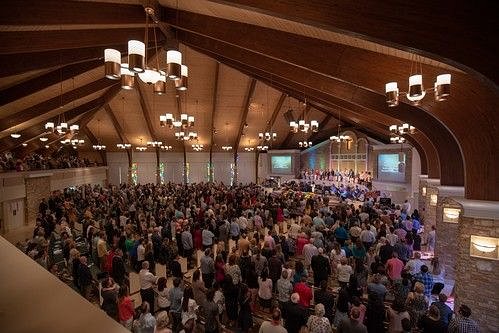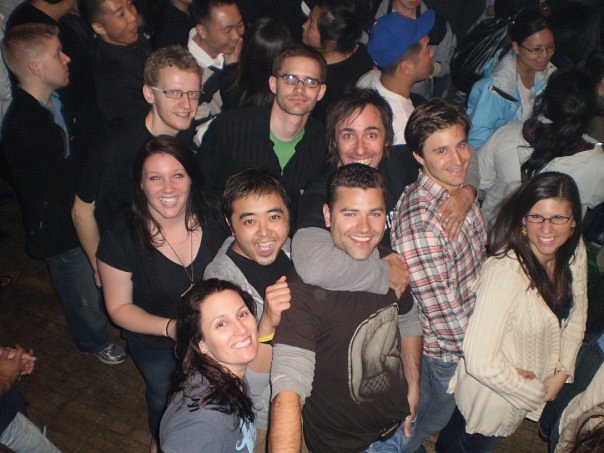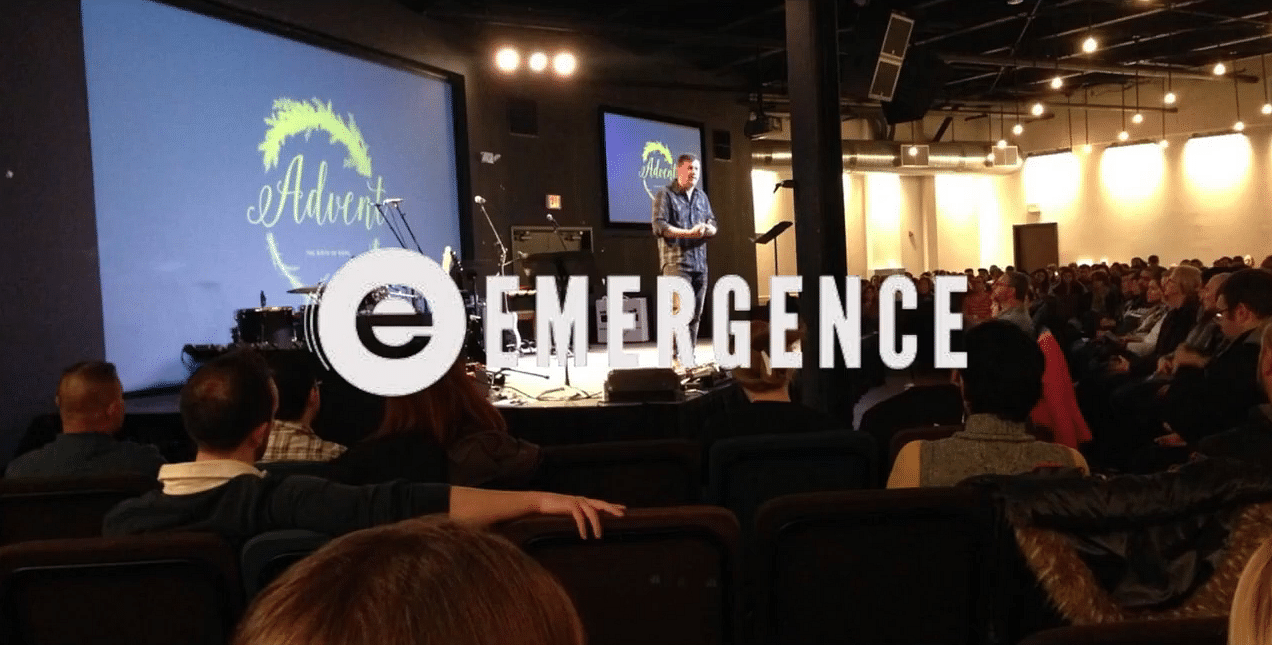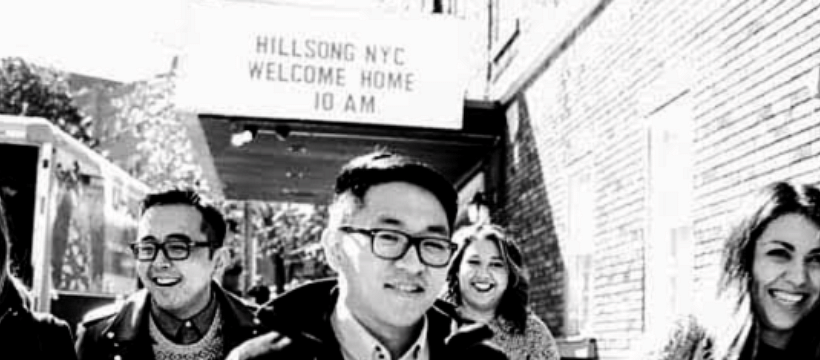Continued from part 1.
My parents weren't quite ready for Liquid. The music was too loud for them, and they just weren't used to rock music in church. But my mom was insistent on us attending church together as a family, so we tried a few new places. We landed for a several months at one of North Jersey's oldest megachurches, Hawthorne Gospel Church. As musicians, my brother and I got involved relatively quickly in their music program, singing and playing violin (me) and clarinet (my brother) as soloists, choir members, and orchestra members.
 And it was fine. The music program was decent. In fact, one of the tenors there had apparently played Valjean on Broadway. On Saturday evenings, they had a rock band for a young adults' service that was very lightly attended; only 100 people would be there in an auditorium that seated 1000. I ended up joining this band briefly as a way to try my hand at worship music in a rock style, and while there I was introduced to another worship song that ended up sticking with me: "Mighty to Save." After performing this song at one of our services, I went home, got on my computer, purchased the album The I Heart Revolution by Hillsong UNITED and listened to the entire thing. Several songs jumped out at me, songs that stayed with me for many years to come and that I would end up leading at various churches around North Jersey and Rockland County, NY, in upcoming years.
And it was fine. The music program was decent. In fact, one of the tenors there had apparently played Valjean on Broadway. On Saturday evenings, they had a rock band for a young adults' service that was very lightly attended; only 100 people would be there in an auditorium that seated 1000. I ended up joining this band briefly as a way to try my hand at worship music in a rock style, and while there I was introduced to another worship song that ended up sticking with me: "Mighty to Save." After performing this song at one of our services, I went home, got on my computer, purchased the album The I Heart Revolution by Hillsong UNITED and listened to the entire thing. Several songs jumped out at me, songs that stayed with me for many years to come and that I would end up leading at various churches around North Jersey and Rockland County, NY, in upcoming years.
And it was because of these songs that I ended up growing more involved at Liquid. While Hawthorne Gospel would do some Hillsong music every so often, Liquid made Hillsong songs part of their weekly setlist. Not a service would go by without one of Hillsong's or Hillsong UNITED's big hits being performed by the band. Eventually the commute to Hawthorne from Morristown became too much, so I stopped making the trek out there and focused my attention on attending—and eventually volunteering at—Liquid.
The church was growing rapidly. When I started attending, Liquid was averaging around 800 across their multiple services on a Sunday. By the time I left in 2010, they were hitting 3000 across all services in multiple locations. It was the most exciting church to be a part of in New Jersey.
My brother and I became close friends with several members of the staff at Liquid, and we sort of organically ended up on their core team of volunteers. I moved from music to children's ministry, and my brother dove further into the music world.
 In the summer of 2009, the Liquid team got a group together to attend a Hillsong UNITED concert at Roseland Ballroom near Hell's Kitchen. I had never been so blown away by a performance in my life. I was moved to tears and loudly singing along to songs I was deeply familiar with as well as songs I was hearing for the first time that night. In my mind, there was no way this wasn't the Holy Spirit.
In the summer of 2009, the Liquid team got a group together to attend a Hillsong UNITED concert at Roseland Ballroom near Hell's Kitchen. I had never been so blown away by a performance in my life. I was moved to tears and loudly singing along to songs I was deeply familiar with as well as songs I was hearing for the first time that night. In my mind, there was no way this wasn't the Holy Spirit.
Admittedly, growing up in the Baptist world did not give me the intensely emotional experiences I was discovering at those concerts. They didn't even attempt to do so. While organizations like Hillsong will use your emotions to coerce you into belief, the churches and schools I grew up in taught me that my emotions were untrustworthy and letting them overwhelm me was a sign that I was giving into my fleshly desires. All of what Hillsong was doing was completely new to me, which made me an easy target for their emotional manipulation.
After a few years at Liquid, both as a volunteer and as a part-time children's ministry leader, I took on a full-time position as the children's minister at another nearby startup church called Emergence.
Emergence was a unique church with a very interesting story of its own. I won't go into much detail here, but they were once the young adult ministry of another of North Jersey's oldest megachurches, Jacksonville Chapel. After attempting to develop a model that would house Emergence within the larger structure of Jacksonville Chapel's ministries while still providing it the freedom to operate as a distinct church, Emergence struck out on its own, quickly reaching small megachurch attendance numbers just a few years after becoming independent.
While not vocally hostile towards Hillsong, my boss made it quite clear that he found Hillsong's music "lacking" in theological substance, and he often mocked their songs for being too close to "love-song-to-Jesus" territory. There were a few Hillsong numbers that were in our rotation, and for the services that I led worship, I did what I could to include one or two of those songs. It was rather telling that one of the very few new (at the time) Hillsong songs I was allowed to introduce to the congregation was the song "Forever Reign," since it started with the very Calvinist-friendly words: "You are good, you are good, when there's nothing good in me."
 My time on staff at Emergence pulled me into a belief system that I recognized from my years in fundamentalism but was somewhat foreign to me as a Baptist. I mean, I could recite the TULIP soteriological model (and like a good Baptist, reject the L in TULIP), but I had never fully embraced the theology or knew any churches that did. I spent a year in what they called "Intensive Discipleship," which reminded me a bit of my two-semester Doctrines course at BJU—a yearlong journey through "studying" Scriptures, discussing doctrinal debates, and reading through books like Church Planter: The Man, the Message, the Mission by Darrin Patrick and Doctrine: What Christians Should Believe by Mark Driscoll & Gerry Breshears. The only differences were that women weren't permitted in Intensive Discipleship, and memorizing Bible passages was required in my BJU Doctrines class.
My time on staff at Emergence pulled me into a belief system that I recognized from my years in fundamentalism but was somewhat foreign to me as a Baptist. I mean, I could recite the TULIP soteriological model (and like a good Baptist, reject the L in TULIP), but I had never fully embraced the theology or knew any churches that did. I spent a year in what they called "Intensive Discipleship," which reminded me a bit of my two-semester Doctrines course at BJU—a yearlong journey through "studying" Scriptures, discussing doctrinal debates, and reading through books like Church Planter: The Man, the Message, the Mission by Darrin Patrick and Doctrine: What Christians Should Believe by Mark Driscoll & Gerry Breshears. The only differences were that women weren't permitted in Intensive Discipleship, and memorizing Bible passages was required in my BJU Doctrines class.
Emergence eventually joined the Acts 29 Network, which was exciting to me as I was growing enamored with churches like Matt Chandler's The Village Church in Texas and Mark Driscoll's growing Evangelical empire, Mars Hill Church in Seattle. I was tearing through every book I could find on "the doctrines of grace," "monergism," and God's sovereignty and immutability. I was beginning to lose my taste for Hillsong's music and developing a new appreciation for the worship tunes of bands like Citizens and Kings Kaleidoscope, who were writing songs dripping with Calvinist dogma.
 As I was making attempts to dive deeper into my new Calvinist identity, I came across the writings of the Baptist theologian Roger E. Olson, whose work reminded me of the Christianity I was raised with, and not the limiting theology found in the Acts 29 churches and their rebranded Calvinism. My excitement over reformed theology and Calvinism began to fade, and it was around this time that something new opened up just east of Union Square at Gramercy Theatre and Irving Plaza—Hillsong NYC.
As I was making attempts to dive deeper into my new Calvinist identity, I came across the writings of the Baptist theologian Roger E. Olson, whose work reminded me of the Christianity I was raised with, and not the limiting theology found in the Acts 29 churches and their rebranded Calvinism. My excitement over reformed theology and Calvinism began to fade, and it was around this time that something new opened up just east of Union Square at Gramercy Theatre and Irving Plaza—Hillsong NYC.
I started visiting a couple years after they first launched, and I immediately felt that familiar rush of emotion, the sense that something exciting was happening here. I was also reminded of the nights I spent going to concerts and indie shows in the city. The songs were upbeat and engaging, and the lyrics full of hopefulness and joy. It was such a stark contrast to the sad, navel-gazing depressive lyrics in the songs we sang at Emergence. The whole atmosphere gave me a glimpse of what I was missing at Emergence, and I couldn't wait to go back.
As my church dug deeper into the "young, restless, reformed" world of New Calvinism (while verbally maintaining that they weren't affiliated with any Calvinist denomination and acting like not mentioning Calvinism or John Calvin by name meant that they weren't Calvinist), I grew increasingly disillusioned with their ideology. I spent time networking with other ministry organizations outside the influence of the Acts 29 Network, and I was discovering other ways of performing ministry that were free of the teachings of Calvinism.
I soon resigned from Emergence and within a few weeks started the process of making Hillsong my home church.
Continued in part 3.



